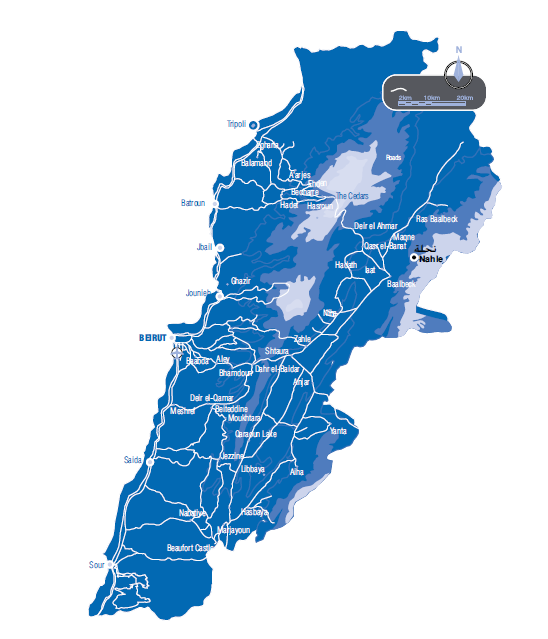Nahle-Water-rich town with thirsty residents
Etymology
In his book, Names of Lebanese Towns and Villages, the author Anis Freiha reports that the name of the town could be of Arabic origins. However, he is more inclined to assume that it is Syriac Aramaic, meaning the valleys and brooklets that dry out in the summer, which applies to some parts of the town.
Location
Nahle is located in the northern part of the Beqa’a Mohafaza, 6 kilometers north east of Baalbeck and 90 kilometers from Beirut. It lies at an altitude of 1300 meters above the seal level and has an approximate area of 12250 hectares. It is bordered by Maqneh and Younine to the south, Baalbeck to the north, Syria to the east and I’aat to the west.
Population and houses
The registered population of Nahle is estimated at 6000. They are Shia’a distributed in about 650 houses. The town has over 50 commercial and craft shops.
Voters
In 2000, there were roughly 2824 registered voters in the town, 1339 of whom exercised their right to vote. The number rose to 3312 in 2009 with 1907 voters casting their ballots.
Voters are distributed by family as follows:
Yazbek (largest family): 820
Yahfoufi: 620
Choucair: 606
Kais: 470
Fares: 187
Hammoud: 145
Othman: 88
Nasreddine: 51
Dandash: 42
Hamadeh: 40
Diab: 32
Added to those are the Mathloum, Wez, Yassine, Alaeddine, Jabali, Darwish, Assi and Hamdan families.
Local authorities
The town has three Mukhtars and a 15-member municipal council established in 1964. Its share of the Independent Municipal Fund was LBP 299.7 million in 2011 up from LBP 224 million in 2007.
Educational institutions
There is one school in the town, Nahle’s Official Elementary School. In the scholarly year 2012-2013, it had 93 students and 20 teachers. A large number of children from the town are enrolled in the schools of Baalbeck.
Economic life
Agriculture is a primary source of livelihood in the town. The availability of water (although nowadays to a lesser extent) and the vast stretches of land facilitate the growing of walnuts, plums and apricots. Few of the residents are beekeepers and others make a living from fish farming. The nature of the town has allowed for the establishment of parks and restaurants that attract visitors from different Lebanese region, in particular Beqa’a.
Problems
Although the town has seven water wells, it still suffers from shortage of water due to the lack of a water network for both irrigation and domestic use. Consequently, residents resort to buying water tanks or installing special networks, thus leading to water misdistribution, not to mention that some of the water resources serve different towns.








Leave A Comment